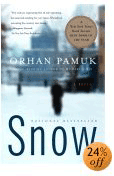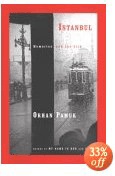Snow

by Orhan Pamuk
448 pages,
ISBN: 0375706860
Istanbul: Memories and the City

by Orhan Pamuk
400 pages,
ISBN: 1400040957
Post Your Opinion | | Pamuk and his "Second Self"
by Michael Harris
Both of Orhan Pamuk's recent books have heroes who hail from Istanbul. In both, the
protagonist is a world-weary writer. One of these offerings, Istanbul, is a memoir of the
author's youth. In it, Pamuk describes (with formidable skill) a city rent by an all-
consuming depression and pained by the memory of its lost grandeur, as a lover might be
on losing his beloved.
"The city into which I was born was poorer, shabbier, and more isolated than it had ever
been before in its two-thousand-year history," writes Pamuk. The family into which he
was born mirrors his city's fate on a micro scale: like a tea party of old Miss Havisham's,
the two peer critically at each other through pounds of make-up. Little Orhan is raised
amongst the grand and decrepit. His father stumbles from one misguided business
venture to the next, dwindling an inherited fortune, and "the cloud of gloom and loss
spread over Istanbul by the fall of the Ottoman Empire had finally claimed my family
too."
It is a story of growing up with loss; of a childhood marinated in melancholy. What could
result but a stellar novelist? Helpfully proving the point, Pamuk published, almost
concurrently with his memoir, a somber, thoughtful novel called Snow. In producing a
memoir and a fiction virtually at once, Pamuk shows us his real face and then covers it.
Margaret Atwood, in an essay on duplicity, posited that every writer has two selves. "I
mean," she explains, "the person who exists when no writing is going forward¨the one
who walks the dog, eats bran for regularity, takes the car to be washed, and so forth¨and
that other, more shadowy and altogether more equivocal personage who shares the same
body, and who, when no one is looking, takes it over and uses it to commit the actual
writing."
Between the lived experience and a fabricated narrator persona, a writer has two lives.
But how to reconcile them? In Istanbul, Pamuk describes a Turkish tense that allows for
the distinction of hearsay from witnessed events¨an entire mode of speech, designed to
make history and daydreams apparent as the fictions they are. This parallel reality, the
story-world we spin into being, is a tantalizing stage for those other "selves" of writers.
Pamuk acts as a messenger in Istanbul, relaying stories between a second life of the
imagination and his "real" lived experience. "For people like me," he explains, "that
second life is none other than the book in your hand."
Anne Carson knows something about this double life: "Writing involves some dashing
back and forth between the darkening landscape where facticity is strewn and a
windowless room cleared of everything I do not know." Pamuk's darkening landscape is
the historical cityscape of Istanbul; his windowless room is the room in which he writes
his memoir¨cold, real, yet somehow not real enough to hold the author's attention. His
memoir wanders through daydreams, offshoots, footnotes.
Pamuk tells how, as a small child, his time in this second world¨made of what? Art?
Hope?¨seemed a unique experience. "It would be years before I discovered that my
strange pastime was commonly known as daydreaming." What's more, the imagination
must be protected form the grubbing touch of reality, if only to safeguard his access:
"Keeping the second world secret made it easier for me to come and go."
The real people of Istanbul do not, taken as a whole, impress little Orhan. Like all bright
children, he is suspicious of the motives of adults; he believes they are caught up in
unimportant matters, that they have lost something essential. Like the once-grand city of
Istanbul (its famed architecture now worn and uncared for) adults are broken, weathered
creatures. "It could be they had once known something of a hidden second world," muses
the child, "but they seemed to have lost their capacity for amazement and forgotten how
to dream, which disability I took to coincide with the sprouting of objectionable hair on
their knuckles and on their necks, in their noses, and in their ears."
The crumbling remains of Ottoman culture sometimes feel like a mere scrim against
which Pamuk's nouveau riche family play their scene. In Dad's 1952 Dodge, the Pamuk
children ride on Sundays along the shore of the Bosphorus. The Pamuk apartments are
crammed with tiny photographs of great ancestors. But this family, too, is being pulled
under by the city's drowning.
Pamuk's work¨his acclaimed novels and, in particular, this loving memoir¨are a kind
of redemption for that half-sunk family. His grandmother called for such a redemption in
her notebook: "With God's will, one day he'll be very successful and the Pamuk family
name will once again be spoken with respect, as it was when his grandfather was alive."
More importantly, Pamuk does not simply relate his personal history, and concomitantly,
his city's history; Pamuk aims to salvage that history. He must, through a loving record,
save it from disappearing.
His strategy is twofold: the memoir and the novel. Snow, Pamuk's latest novel, is the
story of a poet named Ka who has come home to Istanbul after a long absence. For Ka, as
for the Pamuk of Istanbul, optimism is an unnatural state of being. Turkey's identity
crisis consumes the poet's own meagre energies when hunting for love, and for a sense of
self in his homeland.
The best writers have a conflicted relationship with their birth countries, and Istanbul is
the motherlode of conflicted motherlands. Here is a city where "for the past 150 years, no
one has been able to feel completely at home." Here is a city where one encounters "the
lesser detritus of empire in every side street and corner¨the little arches, fountains, and
neighborhood mosques." It is a city filled with broken monuments that "inflict heartache
on all who live among them"¨a city where all is "broken, worn out, past its prime."
"Bleak" doesn't begin to cover it. In fact, Pamuk devotes an entire chapter of his memoir
to explaining a Turkish word¨hnznn¨the only word that can do justice to the state of
Istanbul. Hnznn is a form of melancholy, but it surpasses the individual and romantic
aspect connoted by its English cousin. Hnznn is communal and collective; it describes the
pulse of an entire, brokenhearted city. It is the feeling that bleeds from the ruins when
"the present city is so poor and confused that it can never again dream of rising to its
former heights of wealth, power, and culture."
Are we speaking of Pamuk's city here? Or of his family? Or of his own, now middle-
aged, life? These distinctions evaporate in Istanbul.
As a child "I took pleasure in drawing because it allowed me to create instant miracles
that everyone around me appreciated . . . As this expectation deepened, it became part of
the act of creation and part of its joy." Perhaps this reworks the riddle of Atwood's dual
self. The writer does not aim to merge his two selves through writing. Writers like Pamuk
aim higher; he hopes to bring people closer to people, the past closer to the present; a lost
city closer to itself.
Indeed, embracing the "second life" where the artist-self lives, that shadowy Istanbul of
daydreams and history books, does not cause rifts¨it heals them. "As I'd feel the city's
melancholy¨hnznn¨settling into me, I discovered by chance that when I put pencil to
paper at times like this, I liked what I did much more; as I forgot the world and played
about with my melancholy, its darkness would begin to fade away."
Istanbul was founded on the site of Byzantium, a great Grecian city born in the 7th
century BC. Byzantium became the Roman city of Constantinople, finally adopting its
present name, Istanbul, in the 15th century. In 1923 the gem of the old world lost even its
status as capital of Turkey. The world had begun to forget.
Even the word is introverted, meditative¨"Istanbul" derives from the Greek phrase eis
ten polin, meaning "into the city". Caught at the juncture of Europe and Asia, Istanbul
was born to be the melancholic, middle child of the continent, lost in time and place.
Pamuk was born to be its champion.
|